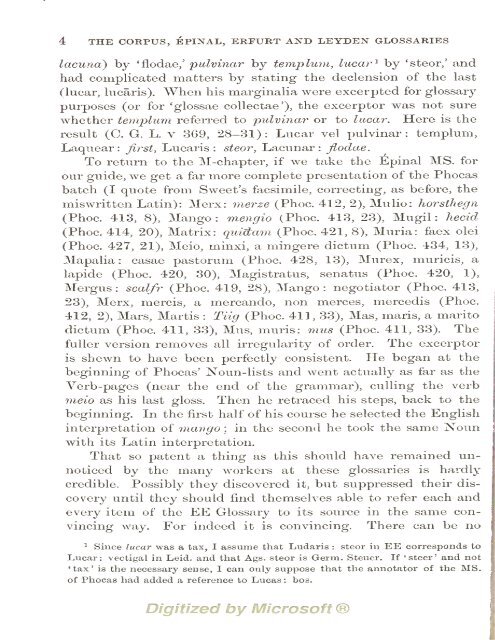the corpus, épinal, erfurt and leyden glossaries, viii - World eBook ...
the corpus, épinal, erfurt and leyden glossaries, viii - World eBook ...
the corpus, épinal, erfurt and leyden glossaries, viii - World eBook ...
Create successful ePaper yourself
Turn your PDF publications into a flip-book with our unique Google optimized e-Paper software.
4 THE CORPUS, EPINAL, ERFURT AND LEYDEN GLOSSARIES<br />
lacuna) by 'flodae/ pulvinar by templum, hicar'^ by 'steor,' <strong>and</strong><br />
had complicated matters by stating <strong>the</strong> declension of <strong>the</strong> last<br />
(lucar, lucaris). When his marginalia were excerpted for glossary<br />
purposes (or for 'glossae collectae'), <strong>the</strong> excerptor was not sure<br />
whe<strong>the</strong>r templum referred to pulvinar or to lucar. Here is <strong>the</strong><br />
result (C. G. L. v 369, 28-31): Lucar vel pulvinar: templum,<br />
Laquear: first, Lucaris: steor, Lacunar: Jlodae.<br />
To return to <strong>the</strong> M-chapter, if we take <strong>the</strong> Epinal MS. for<br />
our guide, we get a far more complete presentation of <strong>the</strong> Phocas<br />
batch (I quote from Sweet's facsimile, correcting, as before, <strong>the</strong><br />
miswritten Latin): Merx: 7nei'ze (Phoc. 412, 2), Mulio: hors<strong>the</strong>gn<br />
hecid<br />
(Phoc. 418, 8), Mango: mengio (Phoc. 413, 23), Mugil :<br />
(Phoc. 414, 20), Matrix: quidam (Phoc. 421, 8), Muria: faex olei<br />
(Phoc. 427, 21), Meio, minxi, a mingere dictum (Phoc. 434, 13),<br />
Mapalia: casae pastorum (Phoc. 428, 13), Murex, muricis, a<br />
lapide (Phoc. 420, 30), Magistratus, senatus (Phoc. 420, 1),<br />
Mergus: scalfr (Phoc. 419, 28), Mango: negotiator (Phoc. 413,<br />
23), Merx, mercis, a merc<strong>and</strong>o, non merces, mercedis (Phoc.<br />
412, 2), Mars, Martis : Tiig (Phoc. 411, 33), Mas, maris, a marito<br />
dictum (Phoc. 411, 83), Mus, muris: mus (Phoc. 411, 33). The<br />
fuller version removes all irregularity of order. The excerptor<br />
is shewn to have been perfectly consistent. He began at <strong>the</strong><br />
beginning of Phocas' Noun-lists <strong>and</strong> went actually as far as <strong>the</strong><br />
Verb-pages (near <strong>the</strong> end of <strong>the</strong> grammar), culling <strong>the</strong> verb<br />
meio as his last<br />
gloss. Then he retraced his steps, back to <strong>the</strong><br />
beginning. In <strong>the</strong> first half of his course he selected <strong>the</strong> English<br />
in <strong>the</strong> second he took <strong>the</strong> same Noun<br />
interpretation of mango ;<br />
with its Latin interpretation.<br />
That so patent a thing as this should have remained un-<br />
noticed by <strong>the</strong> many workers at <strong>the</strong>se <strong>glossaries</strong> is hardly<br />
credible. Possibly <strong>the</strong>y discovered it, but suppressed <strong>the</strong>ir dis-<br />
covery until <strong>the</strong>y<br />
every item of <strong>the</strong> EE Glossary<br />
should find <strong>the</strong>mselves able to refer each <strong>and</strong><br />
to its source in <strong>the</strong> same con-<br />
vincing way. For indeed it is convincing. There can be no<br />
^ Since lucar was a tax, I assume that Ludaris : steor in EE corresponds to<br />
Lucar: vectigal in Leid. <strong>and</strong> that Ags. steor is Germ. Steuer. If 'steer' <strong>and</strong> not<br />
'tax' is <strong>the</strong> necessary sense, I can only suppose that <strong>the</strong> annotator of <strong>the</strong> MS.<br />
of Phocas had added a reference to Lucas : bos.

















